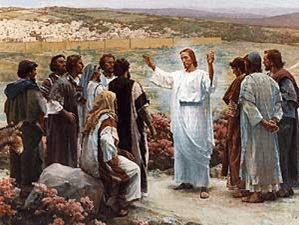
Lesson 11
Becoming a Disciple of Christ
How can a person become a true disciple of Christ? In the Gospels, Jesus tells us the conditions of being His true disciple: “Whoever wishes to come after me must deny himself, take up his cross, and follow me. For whoever wishes to save his life will lose it, but whoever loses his life for my sake will find it. What profit would there be for one to gain the whole world and forfeit his life? Or what can one give in exchange for his life? For the Son of Man will come with his angels in his Father’s glory, and then he will repay everyone according to his conduct.” (Matthew 16:24-27)
In order to live as a disciple of Christ, we must be willing to make sacrifices and overcome temptations which lead to sin. As we are baptized in Christ, we are called to live a good and holy life. A life lived in Christ means obeying God’s commandments, avoiding sin and loving God and our neighbor. Jesus said, “If you wish to enter into life, keep the commandments” (Matthew 19:17).
God’s commandments are signs of His covenant with His people; in them, God has revealed His will. At the same time, God’s commandments are signs of God’s love, because obeying the commandments draws us closer to Him. God’s commandments express the natural law, which is the basis of all morality. The Catechism teaches us that the natural law expresses the original moral sense which enables man to discern by reason the good and the evil, the truth and the lie. The natural law is written and engraved in the soul of each and every man, because human reason ordains him to do good and forbids him to sin. (CCC 1954)
One of the most common temptations which many young people find difficult to deal with are those which lead to the sins of impurity. Sins of impurity can be committed in thought, word or deed. At the Sermon on the Mount, Jesus taught the people: “You have heard that it was said, ‘You shall not commit adultery.’ But I say to you, everyone who looks at a woman with lust has already committed adultery with her in his heart.” (Matthew 5:27-28)
A Christian must not entertain impure thoughts or engage in impure conversations. Impure acts with oneself or others must also be avoided. Being chaste means working to control one’s desires and being careful not to give into the temptation to use God’s gift of sexuality to satisfy one’s own selfish wants. For unmarried people, being chaste includes following the teaching that sexual love is meant for the lifelong commitment of marriage. For married people, being chaste includes being faithful to one’s spouse. The sixth commandment obliges us to be chaste in life.
The Church administers the sacraments to help us in our journey in life. The Eucharist nourishes our soul and spirit; it gives us the grace to increase in love for God and charity for our neighbor. Penance and Reconciliation forgives the sins we have committed; it restores the sanctifying grace which we received at our baptism and the fortitude for a firm purpose of amendment. Matrimony gives married couples the grace to overcome difficulties in married life and to live as “one flesh.”
Questions:
- What does it mean to live as a disciple of Christ?
- What does the Catechism of the Catholic Church teach us about natural law?
- In what ways does a Christian live a pure and chaste life?
- Give 3 examples of sacraments and the grace each one gives to help us in our journey in life.